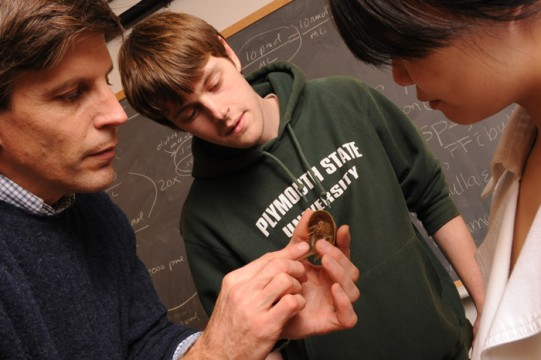Led by the Geisel School of Medicine at Dartmouth and the University of New Hampshire, the New Hampshire IDeA Network of Biomedical Research Excellence (NH-INBRE)—a statewide collaborative partnership of two- and four-year colleges—has received a five-year $18.1 million grant from the National Institutes of Health (NIH) to continue a successful program aimed at expanding biomedical research capacity and training in New Hampshire.
The IDeA program builds research capacities in states that historically have had low levels of NIH funding by supporting basic, clinical, and translational research, faculty development, and infrastructure improvement. The program brings together research faculty from across Dartmouth, including Arts & Sciences and the Geisel School of Medicine, and UNH to serve faculty and students at colleges and universities across the state. This is NH-INBRE’s second NIH IDeA grant.
“The renewal of this grant is recognition of the success of the Dartmouth-led NH-INBRE program,” says Dartmouth Provost Carolyn Dever, PhD. “It will strengthen the efforts of our INBRE network to improve New Hampshire’s research infrastructure, and to educate and inspire undergraduate students to pursue careers biomedical research.”
Well-trained researchers are a crucial component of successful biomedical research, which can lead to improved health and health care. NH-INBRE supports biomedical research and research training in New Hampshire by offering technical training programs, supporting facility improvement, sponsoring employment in research labs for undergraduates, and supporting a Bioinformatics Shared Resource for bioinformatics utilization and training. The UNH Bioinformatics Core facility provides bioinformatics services to NH-INBRE partners with access to outstanding, state-of-the-art computing for genomic analysis, on site training modules in genomics and bioinformatics, deep DNA sequencing, gene expression, and many other important biomedical research tools.

NH-INBRE also identifies and funds outstanding biomedical researchers among faculty members of partner institutions across New Hampshire so they can lead research programs that contribute to biomedical research, and in turn acquaint their students with top-level research, building important skills needed to succeed in NH’s growing biotechnology sector.
“New Hampshire is home to 50 companies in the biotechnology and pharmaceutical fields and they require a well trained workforce,” says Ronald Taylor, NH-INBRE’s program director and principle investigator. “Several students who conducted NH-INBRE supported research have obtained research technician positions at some of these companies.” Taylor is a professor of microbiology and immunology at Dartmouth’s Geisel School of Medicine.
NH-INBRE’s initial NIH grant supported nearly 600 New Hampshire college students who participated in 25 research projects funded at partner schools, which include Colby-Sawyer College, Franklin Pierce University, Keene State College, New England College, Plymouth State University, Saint Anselm College, and the Community College System of New Hampshire.
This renewal grant will continue supporting NH-INBRE’s innovative nursing research initiatives—including the summer undergraduate nursing research program, pairing students with nursing mentors, developing nursing researchers, and collaborating with the Dartmouth CTSA (SYNERGY) Program to develop a nursing research database both statewide and across New England to advance nursing research efforts.
“Since 2012, six summer nursing research students have accepted jobs at Dartmouth-Hitchcock Medical Center and two have entered into post-graduate nursing programs that emphasize research,” says Jennifer Smith, the program’s research project manager. “NH-INBRE continues to serve as a pipeline for injecting research-trained individuals into the New Hampshire workforce.”

A 2015 report from American Association of Advancement of Science Review Panel commended the NH-INBRE program for “the way that it has continued to deeply engage the Primary Undergraduate Institutions as true partners and in the way that the program continues to make significant investments in supporting the faculty members and students at the PUI campuses. This partnership has contributed to the PUIs developing a shared ownership of the program, as well as each PUI taking the goals of the program back to their own campuses to help shape positive changes at the individual institutions. Overall, the high degree of partnership that exists has been a key element in the success of the NH-INBRE program.”
Visit NHINBRE.org to learn more about the program’s activities around the state and to read student success stories.